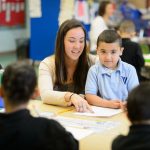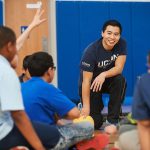Combrie and Yeon both discussed CFJ’s impact in the “Nourishing Youth Activism” session, part of the University of Connecticut Neag School of Education’s secondary English education program, “(Re) Imagining a More Just English Education.” A small group of secondary English education majors gathered around a table in the Gentry Building to hear the speakers discuss the program.
The Neag School of Education received a $400,000 gift from the Neag Foundation to establish the Neag Foundation Scholarship for the Integrated Bachelor’s/Master’s (IB/M) Program at UConn’s Neag School of Education. The scholarship will support fifth-year IB/M students with demonstrated financial need.
Two long-running educational programs at UConn for Supplemental Nutrition Assistant Program (SNAP) recipients are combining under a new $4.2 million USDA grant. Neag School Professor Jennifer McGarry in the Department of Educational Leadership and executive director of Husky Sport is the PI on this grant.
Accessibility to job opportunities has long been a challenge for individuals with disabilities. In 2020, people with disabilities had a much higher unemployment rate (12.6%) than those without a disability (7.9%). To raise awareness about disability employment issues and celebrate the contributions of workers with disabilities, National Disability Employment Awareness Month (NDEAM) is held every October. The 2021 theme for NDEAM is “America’s Recovery: Powered by Inclusion,” which underscores the importance of ensuring that people with disabilities have access to employment as the nation recovers from the pandemic.
Rachael Gabriel is associate professor of literacy education at UConn’s Neag School of Education. When large numbers of people showed up at legislative hearings in Connecticut, she became interested in their unusual engagement and strangely similar comments. Gabriel used critical discursive psychology, positioning theory, and narrative policy analysis to analyze the dyslexia law advocacy.
The National Association for Gifted Children (NAGC) is pleased to announce Dr. Del Siegle will receive the 2021 NAGC Ann F. Isaacs Founder’s Memorial Award for his distinguished service to NAGC and gifted education.
Two long-running educational programs at UConn for Supplemental Nutrition Assistant Program (SNAP) recipients are combining under a new $4.2 million USDA grant. This new effort, known as Husky Programs, will combine the strengths of both programs to increase the breadth and reach of UConn’s SNAP-Ed efforts. Neag School Professor Jennifer McGarry in the Department of Educational Leadership and executive director of Husky Sport is the PI on this grant
The Neag School of Education, the Connecticut Writing Project, and the UConn Department of English invite your students to enter the 29th annual Letters About Literature contest.
As a psychologist and a parent of children participating in youth sports, it has been exciting for me to witness the increasing media attention on mental health and athletics. Mental toughness has long been a central topic within sports circles, but the current discussions are different. The past year has brought the mental health and well-being of athletes into mainstream conversation, whether it be as a plotline in season two of Apple TV’s “Ted Lasso” (promise, no more spoilers!), professional athletes’ stories highlighted during World Mental Health Day, or Simon Biles’ withdrawal from events at the Tokyo Olympics.
“As a psychologist and a parent of children participating in youth sports, it has been exciting for me to witness the increasing media attention on mental health and athletics. Mental toughness has long been a central topic within sports circles, but the current discussions are different. The past year has brought the mental health and well-being of athletes into mainstream conversation, whether it be as a plotline in season two of Apple TV’s “Ted Lasso” (promise, no more spoilers!), professional athletes’ stories highlighted during World Mental Health Day, or Simon Biles’ withdrawal from events at the Tokyo Olympics,” says Sandra Chafouleas, a UConn Board of Trustees Distinguished Professor of Educational Psychology in the Neag School of Education.




